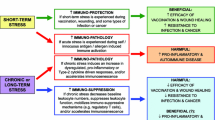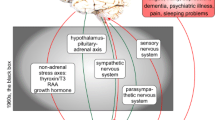Abstract
Several factors impact the immune responses such as the chemical nature of antigens, the physiologic and metabolic condition of the responsive cells, the site of antigen recognition, and neuroendocrine and pharmacological received agents. Incompatibility of host immune responses to the entrapped antigens leads to an immune pathological manner instead of an immune protection which results in the disharmony of the immune effective factors. Besides the fact that stress is one of the most common effective factors in human life, it also contributed to the protection, suppression, and pathology of the immune system. In this review article, the direct and indirect effects of the stress on the function of T cells and the contributed mechanism of action will be discussed.




Similar content being viewed by others
References
Arbore G et al (2016) T helper 1 immunity requires complement-driven NLRP3 inflammasome activity in CD4+ T cells. Science 352:aad1210. https://doi.org/10.1126/science.aad1210
Banuelos J, Shin S, Cao Y, Bochner BS, Morales-Nebreda L, Budinger GR, Zhou L, Li S, Xin J, Lingen MW, Dong C, Schleimer RP, Lu NZ (2016) BCL-2 protects human and mouse Th17 cells from glucocorticoid-induced apoptosis. Allergy 71:640–650. https://doi.org/10.1111/all.12840
Bereshchenko O, Coppo M, Bruscoli S, Biagioli M, Cimino M, Frammartino T, Sorcini D, Venanzi A, di Sante M, Riccardi C (2014) GILZ promotes production of peripherally induced Treg cells and mediates the crosstalk between glucocorticoids and TGF-β signaling. Cell Rep 7:464–475. https://doi.org/10.1016/j.celrep.2014.03.004
Beurel E, Harrington LE, Jope RS (2013) Inflammatory T helper 17 cells promote depression-like behavior in mice. Biol Psychiatry 73:622–630. https://doi.org/10.1016/j.biopsych.2012.09.021
Bierhaus A et al (2003) A mechanism converting psychosocial stress into mononuclear cell activation. Proc Natl Acad Sci 100:1920–1925. https://doi.org/10.1073/pnas.0438019100
Brewer JA, Kanagawa O, Sleckman BP, Muglia LJ (2002) Thymocyte apoptosis induced by T cell activation is mediated by glucocorticoids in vivo. J Immunol 169:1837–1843. https://doi.org/10.1073/pnas.0438019100
Capece D, Verzella D, Fischietti M, Zazzeroni F, Alesse E (2012) Targeting costimulatory molecules to improve antitumor immunity. Biomed Res Int 2012. https://doi.org/10.1155/2012/926321
Chikanza I, Kozaci D (2004) Corticosteroid resistance in rheumatoid arthritis: molecular and cellular perspectives. Rheumatology 43:1337–1345. https://doi.org/10.1093/rheumatology/keh333
Chrousos G (2000) The role of stress and the hypothalamic–pituitary–adrenal axis in the pathogenesis of the metabolic syndrome: neuro-endocrine and target tissue-related causes. Int J Obes 24:S50. https://doi.org/10.1038/sj.ijo.0801278
De Iudicibus S, Franca R, Martelossi S, Ventura A, Decorti G (2011) Molecular mechanism of glucocorticoid resistance in inflammatory bowel disease. World J Gastroenterol 17:1095–1108. https://doi.org/10.3748/wjg.v17.i9.1095
Delahanty DL, Raimonde AJ, Spoonster E (2000) Initial posttraumatic urinary cortisol levels predict subsequent PTSD symptoms in motor vehicle accident victims. Biol Psychiatry 48:940–947. https://doi.org/10.1016/S0006-3223(00)00896-9
Dhabhar FS (2014) Effects of stress on immune function: the good, the bad, and the beautiful. Immunol Res 58:193–210. https://doi.org/10.1007/s12026-014-8517-0
Dhabhar FS, Mcewen BS (1997) Acute stress enhances while chronic stress suppresses cell-mediated immunity in vivo: a potential role for leukocyte trafficking. Brain Behav Immun 11:286–306. https://doi.org/10.1006/brbi.1997.0508
Dhabhar FS, McEwen BS (1999) Enhancing versus suppressive effects of stress hormones on skin immune function. Proc Natl Acad Sci 96:1059–1064. https://doi.org/10.1073/pnas.96.3.1059
Di Benedetto S, Derhovanessian E, Steinhagen-Thiessen E, Goldeck D, Müller L, Pawelec G (2015) Impact of age, sex and CMV-infection on peripheral T cell phenotypes: results from the Berlin BASE-II study. Biogerontology 16(5):631–643. https://doi.org/10.1007/s10522-015-9563-2
Engler JB, Kursawe N, Solano ME, Patas K, Wehrmann S, Heckmann N, Lühder F, Reichardt HM, Arck PC, Gold SM, Friese MA (2017) Glucocorticoid receptor in T cells mediates protection from autoimmunity in pregnancy. Proc Natl Acad Sci 114:E181–E190. https://doi.org/10.1073/pnas.1617115114
Fan X, Wang Y (2009) β2 adrenergic receptor on T lymphocytes and its clinical implications. Prog Nat Sci 19:17–23. https://doi.org/10.1016/j.pnsc.2008.10.001
Fung TC, Olson CA, Hsiao EY (2017) Interactions between the microbiota, immune and nervous systems in health and disease. Nat Neurosci 20:145–155. https://doi.org/10.1038/nn.4476
Gordon CL, Miron M, Thome JJ, Matsuoka N, Weiner J, Rak MA, Igarashi S, Granot T, Lerner H, Goodrum F (2017) Tissue reservoirs of antiviral T cell immunity in persistent human CMV infection. J Exp Med 214(3):651–667. https://doi.org/10.1084/jem.20160758
Hannibal KE, Bishop MD (2014) Chronic stress, cortisol dysfunction, and pain: a psychoneuroendocrine rationale for stress management in pain rehabilitation. Phys Ther 94:1816–1825. https://doi.org/10.2522/ptj.20130597
Herold M, McPherson K, Reichardt H (2006) Glucocorticoids in T cell apoptosis and function. Cell Mol Life Sci 63:60–72. https://doi.org/10.1007/s00018-005-5390-y
Jacobs SR, Herman CE, MacIver NJ, Wofford JA, Wieman HL, Hammen JJ, Rathmell JC (2008) Glucose uptake is limiting in T cell activation and requires CD28-mediated Akt-dependent and independent pathways. J Immunol 180:4476–4486. https://doi.org/10.4049/jimmunol.180.7.4476
Jeffrey SF, Lisa HU, George PC (1995) The Hypothalamic–Pituitary–Adrenal Axis and Immune-Mediated Inflammation. J Clin Med 332 (20):1351–1363
Krishnan V, Nestler EJ (2008) The molecular neurobiology of depression. Nature 455:894
Kumar BV, Connors TJ, Farber DL (2018) Human T cell development, localization, and function throughout life. Immunity 48(2):202–221. https://doi.org/10.1016/j.immuni.2018.01.007
Lewitus GM, Cohen H, Schwartz M (2008) Reducing post-traumatic anxiety by immunization. Brain Behav Immun 22:1108–1114. https://doi.org/10.1038/nature07455
Libert C, Dejager L (2014) How steroids steer T cells. Cell Rep 7:938–939
Loke T-K, Sousa AR, Corrigan CJ, Lee TH (2002) Glucocorticoid-resistant asthma. Curr Allergy Asthma Rep 2:144–150. https://doi.org/10.1016/j.celrep.2014.04.041
Maydych V, Claus M, Dychus N, Ebel M, Damaschke J, Diestel S, Wolf OT, Kleinsorge T, Watzl C (2017) Impact of chronic and acute academic stress on lymphocyte subsets and monocyte function. PLoS One 12:e0188108. https://doi.org/10.1371/journal.pone.0188108
McEwen BS (1998) Protective and damaging effects of stress mediators. N Engl J Med 338:171–179. https://doi.org/10.1056/NEJM199801153380307
McEwen BS, Bowles NP, Gray JD, Hill MN, Hunter RG, Karatsoreos IN, Nasca C (2015) Mechanisms of stress in the brain. Nat Neurosci 18:1353–1363. https://doi.org/10.1038/nn.4086
Michalek RD et al (2011) Cutting edge: distinct glycolytic and lipid oxidative metabolic programs are essential for effector and regulatory CD4+ T cell subsets. J Immunol 1003613. https://doi.org/10.4049/jimmunol.1003613
Miller AH, Raison CL (2016) The role of inflammation in depression: from evolutionary imperative to modern treatment target. Nat 16:22–34. https://doi.org/10.1038/nri.2015.5
Pace TW, Mletzko TC, Alagbe O, Musselman DL, Nemeroff CB, Miller AH, Heim CM (2006) Increased stress-induced inflammatory responses in male patients with major depression and increased early life stress. Am J Psychiatry 163:1630–1633. https://doi.org/10.1176/ajp.2006.163.9.1630
Patsoukis N, Bardhan K, Chatterjee P, Sari D, Liu B, Bell LN, Karoly ED, Freeman GJ, Petkova V, Seth P, Li L, Boussiotis VA (2015) PD-1 alters T-cell metabolic reprogramming by inhibiting glycolysis and promoting lipolysis and fatty acid oxidation. Nat Commun 6:6692. https://doi.org/10.1038/ncomms7692
Paugh SW, Bonten EJ, Savic D, Ramsey LB, Thierfelder WE, Gurung P, Malireddi RK, Actis M, Mayasundari A, Min J, Coss DR, Laudermilk LT, Panetta JC, McCorkle J, Fan Y, Crews KR, Stocco G, Wilkinson MR, Ferreira AM, Cheng C, Yang W, Karol SE, Fernandez CA, Diouf B, Smith C, Hicks JK, Zanut A, Giordanengo A, Crona D, Bianchi JJ, Holmfeldt L, Mullighan CG, den Boer M, Pieters R, Jeha S, Dunwell TL, Latif F, Bhojwani D, Carroll WL, Pui CH, Myers RM, Guy RK, Kanneganti TD, Relling MV, Evans WE (2015) NALP3 inflammasome upregulation and CASP1 cleavage of the glucocorticoid receptor cause glucocorticoid resistance in leukemia cells. Nat Genet 47:607–614. https://doi.org/10.1038/ng.3283
Pazirandeh A, Xue Y, Prestegaard T, Jondal M, Okret S (2002) Effects of altered glucocorticoid sensitivity in the T cell lineage on thymocyte and T cell homeostasis. FASEB J 16:727–729. https://doi.org/10.1096/fj.01-0891fje
Raison CL, Miller AH (2003) When not enough is too much: the role of insufficient glucocorticoid signaling in the pathophysiology of stress-related disorders. Am J Psychiatry 160:1554–1565. https://doi.org/10.1176/appi.ajp.160.9.1554
Saint-Mezard P et al (2003) Psychological stress exerts an adjuvant effect on skin dendritic cell functions in vivo. J Immunol 171:4073–4080. https://doi.org/10.4049/jimmunol.171.8.4073
Sanders VM (2012) The beta2-adrenergic receptor on T and B lymphocytes: do we understand it yet? Brain Behav Immun 26:195–200. https://doi.org/10.1016/j.bbi.2011.08.001
Sani MRM, Moghaddam MM, Aghamollaei H, Hassanpour K, Taheri RA, Farnoosh G (2014) Investigation of caspase-1 activity and interleukin-1β production in murine macrophage cell lines infected with Leishmania major. Asian Pac J Trop Med 7:S70–S73. https://doi.org/10.1016/S1995-7645(14)60205-4
Shonkoff JP, Boyce WT, McEwen BS (2009) Neuroscience, molecular biology, and the childhood roots of health disparities: building a new framework for health promotion and disease prevention. JAMA 301:2252–2259. https://doi.org/10.1001/jama.2009.754
Silverman MN, Pearce BD, Biron CA, Miller AH (2005) Immune modulation of the hypothalamic-pituitary-adrenal (HPA) axis during viral infection. Viral Immunol 18(1):41–78. https://doi.org/10.1089/vim.2005.18.41
Slota C, Shi A, Chen G, Bevans M, N-p W (2015) Norepinephrine preferentially modulates memory CD8 T cell function inducing inflammatory cytokine production and reducing proliferation in response to activation. Brain Behav Immun 46:168–179. https://doi.org/10.1016/j.bbi.2015.01.015
Song M, Sandoval TA, Chae C-S, Chopra S, Tan C, Rutkowski MR, Raundhal M, Chaurio RA, Payne KK, Konrad C (2018) IRE1α–XBP1 controls T cell function in ovarian cancer by regulating mitochondrial activity. Nature 562(7727):423–428. https://doi.org/10.1038/s41586-018-0597-x
Thome JJ, Bickham KL, Ohmura Y, Kubota M, Matsuoka N, Gordon C, Granot T, Griesemer A, Lerner H, Kato T (2016) Early-life compartmentalization of human T cell differentiation and regulatory function in mucosal and lymphoid tissues. Nat Med 22(1):72–77. https://doi.org/10.1038/nm.4008
ThyagaRajan S, Priyanka H, Pundir U (2012) Aging alters sympathetic noradrenergic innervation and immune reactivity in the lymphoid organs: strategies to reverse neuro-immune senescence. BrainImmune Online J
Tsigos C, Kyrou I, Kassi E, Chrousos GP (2016) Stress, endocrine physiology and pathophysiology
Van der Windt GJ, Pearce EL (2012) Metabolic switching and fuel choice during T-cell differentiation and memory development. Immunol Rev 249:27–42. https://doi.org/10.1111/j.1600-065X.2012.01150.x
Wahle M, Stachetzki U, Krause A, Pierer M, Häntzschel H, Baerwald C (2001) Regulation of beta2-adrenergic receptors on CD4 and CD8 positive lymphocytes by cytokines in vitro. Cytokine 16:205–209. https://doi.org/10.1006/cyto.2001.0965
Walsh JT, Hendrix S, Boato F, Smirnov I, Zheng J, Lukens JR, Gadani S, Hechler D, Gölz G, Rosenberger K, Kammertöns T, Vogt J, Vogelaar C, Siffrin V, Radjavi A, Fernandez-Castaneda A, Gaultier A, Gold R, Kanneganti TD, Nitsch R, Zipp F, Kipnis J (2015) MHCII-independent CD4+ T cells protect injured CNS neurons via IL-4. J Clin Invest 125:699–714. https://doi.org/10.1172/JCI76210
Yang Z, Matteson EL, Goronzy JJ, Weyand CM (2015) T-cell metabolism in autoimmune disease. Arthritis Res Ther 17:29. https://doi.org/10.1186/s13075-015-0542-4
Yehuda R (2001) Biology of posttraumatic stress disorder. J Clin Psychiatry 62:41–44
Yoles E, Hauben E, Palgi O, Agranov E, Gothilf A, Cohen A, Kuchroo V, Cohen IR, Weiner H, Schwartz M (2001) Protective autoimmunity is a physiological response to CNS trauma. J Neurosci 21:3740–3748. https://doi.org/10.1523/JNEUROSCI.21-11-03740.2001
Ziv Y, Ron N, Butovsky O, Landa G, Sudai E, Greenberg N, Cohen H, Kipnis J, Schwartz M (2006) Immune cells contribute to the maintenance of neurogenesis and spatial learning abilities in adulthood. Nat Neurosci 9:268–275. https://doi.org/10.1038/nn1629
Acknowledgments
The author would like to thank Kashan University of Medical Sciences.
Author information
Authors and Affiliations
Corresponding author
Ethics declarations
Conflict of interest
The authors declare that they have no conflict of interest.
Additional information
Publisher’s note
Springer Nature remains neutral with regard to jurisdictional claims in published maps and institutional affiliations.
Rights and permissions
About this article
Cite this article
Khedri, M., Samei, A., Fasihi-Ramandi, M. et al. The immunopathobiology of T cells in stress condition: a review. Cell Stress and Chaperones 25, 743–752 (2020). https://doi.org/10.1007/s12192-020-01105-0
Received:
Revised:
Accepted:
Published:
Issue Date:
DOI: https://doi.org/10.1007/s12192-020-01105-0




